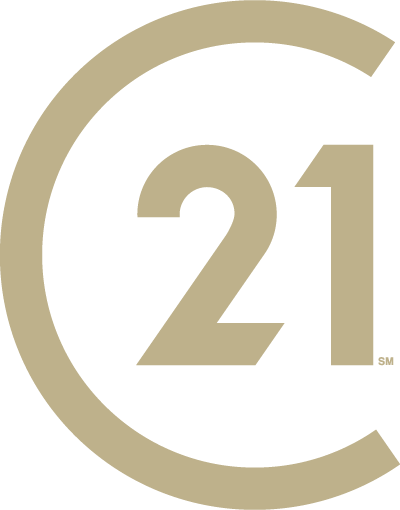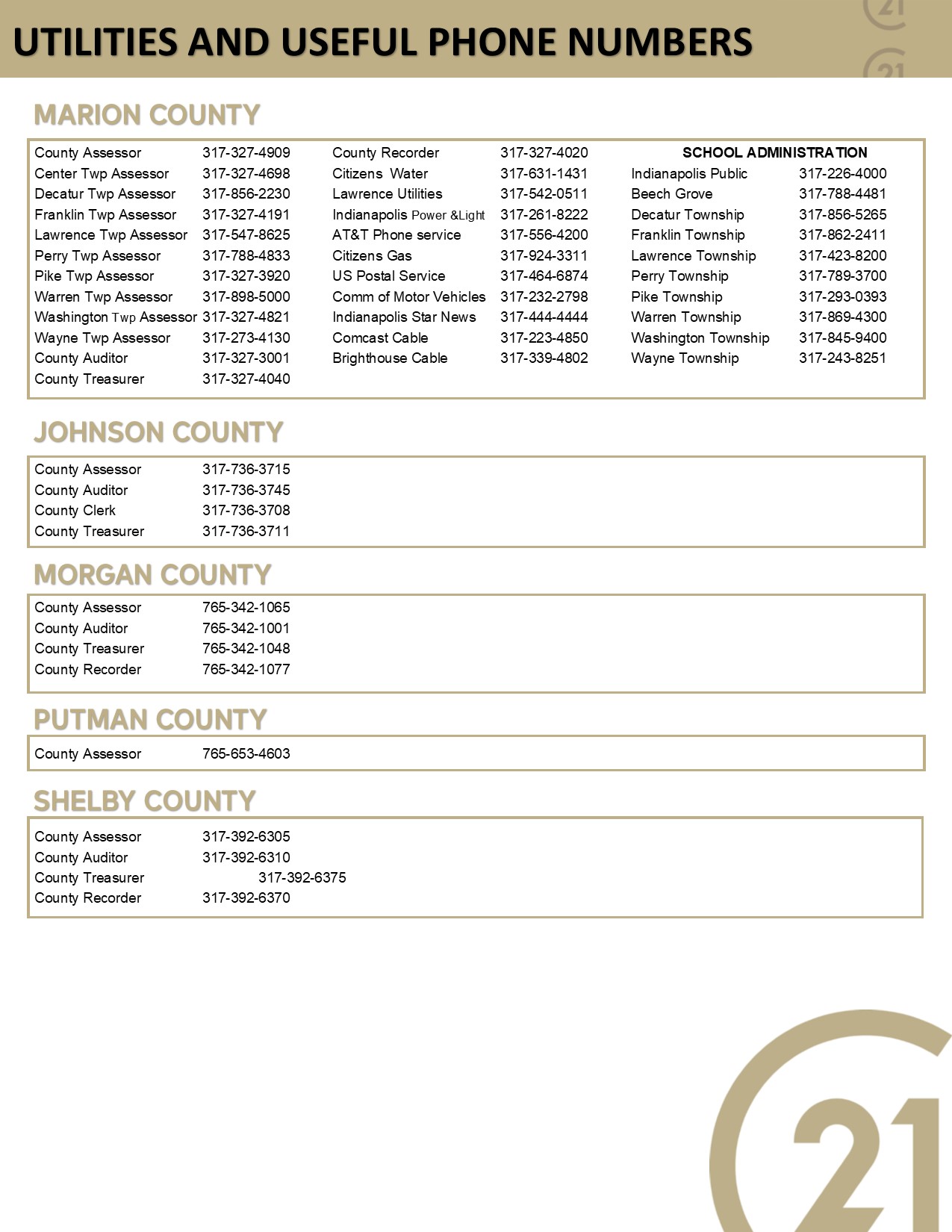Real Estate Resources


Lenders
Sue Vizral
Hallmark Home Mortgage
Lisa Stayton
Amerifirst Home Morgage
Bob Waddey
Prime Lending
Nick Claghorn
AnnieMac Home Mortgage
Janai Santana Roberts
Elements Financial
Inspectors
Trent Paino
Heartland Housemaster Home Inspections
Phone (317) 209-9100
Jon Carrothers
Pillar To Post Home Inspectors
Mobile (317) 550-4044
Jon.carrothers@pillartopost.com
Pillartopost.com/joncarrothers
Taylor Johnson
Cornerstone Home Inspections
Phone (317) 815-9497
Cinspection.com
Real Estate Photography
360 Tour Designs
Of Central Indiana
Phone (317) 640-7257
HD Photography, 3D Walk-throughs, FAA approved aerial stills and video
Staging
Whitney Vredenburg
Stager, Nested Spaces
Mobile (314) 799-7965
Stager, decorator, holiday staging

Central Indiana Utilites and Useful Numbers


Whether you are buying your next home, selling your house or just wanting to know more about the areas that I’m an expert on, I got you!
Here are some Important Phone Numbers divided by counties.


CMA: Comparative Market Analysis

How to Use a CMA Comparative Market Analysis
by Elizabeth Weintraub
Before putting a home on the market or listing with a real estate agent, savvy home sellers obtain a comparative market analysis, also referred to in the industry as a CMA. You’ve probably received direct mail letters or postcards from local real estate agents about CMAs. These pitches offer you a free report to tell you how much your home is worth. Sellers use a CMA to figure out home pricing.
What is a Comparative Market Analysis?
Although reports can vary, from a two-page list of comparable home sales to a 50-page comprehensive guide, the length and complexity of the report depends on the agent’s business practice. However, standard comparative market analysis reports tend to contain the following data:
- Active Listings. Active listings are homes currently for sale. These listings matter only to the extent that they are your competition for buyers. They are not indicative of market value because sellers can ask whatever they want for their home. It doesn’t mean any of the prices are realistic. The offered sales prices do not reflect market value until they sell, and in buyer’s markets, for example, most sell for a lot less.
- Pending Listings. Pending sale homes are formerly active listings that are under contract. They have not yet closed, so they are not yet a comparable sale. Unless the listing agent is willing to share information about the pending sale — and many are not — you will not know the actual sold price until the transaction closes. However, pending sales do indicate the direction the market is moving. If your home is priced above the list price of these pending sales, you could face longer DOM.
- Sold Listings. Homes that have closed within the past three months are your comparable sales. These are the sales an appraiser will use when appraising your home for the buyer, along with the pending sales (which will likely have closed by the time your home is sold). Look long and hard at the comparable sales because those are your market value. You can use 6 months of comps if there are not enough sales to produce a good report with three months.
- Off-Market / Withdrawn / Canceled. These are properties that were taken off the market for a variety of reasons. Usually, the reason homes are removed from the market is because the prices were too high. The median prices of this group will almost always be higher than the median prices of comparable sales. However, listings cancel also for the following reasons:
- Seller’s remorse. The sellers decided they cannot part with their home and no longer want to sell.
- Priced too high. Nobody made an offer or the only offers received were low-ball offers, which were rejected.
- The DOM were too long. Agents sometimes withdraw listings so they can put them back as a new listing and entice more buyers.
- Repair requests. The homes were once under contract and after the home inspection, the buyer requested repairs which the seller refused.
- Seller fired the agent. It’s not uncommon for unhappy sellers to fire an agent and hire a new agent.
- Expired Listings This group will reflect the highest median sales price because they did not sell and were probably unreasonably priced. Some of the expired listings could also show up as an active listing, listed by a new agent at a new price. Listings also expire because they were not aggressively marketed or because the home was in need of repairs.
Examining Comparable Sales
Comparable sales are those that most closely resemble your home. It is difficult to compare a tri-level home to a single-story home. Select the homes from this list that are mostly identical to your home in size, shape and condition, such as:
- Similar square footage Appraisers compare homes based on square footage. Larger square-foot homes are worth less per square foot than smaller square-foot homes. The variance among a group of median-priced homes ideally should not exceed more than a 10% to 20% variance in square feet, plus or minus.
- Similar age of construction Ideally, the age of the home — the year it was built — should be within a few years of other comparable sold homes. Mixed-age subdivisions are common. For example, in one area of Sacramento, a subdivision consists of homes built in the 1950s, and then they jump a couple decades to the 1970s. Although the homes are located next door to each other, the homes loaded with character from the 1950s sell for more than their newer Brady Bunch counterparts. If your home was built in 1980, say, and brand new homes up the street are selling for more, you cannot command the same price as a new home.
- Similar amenities, upgrades, and condition Appraisers will deduct value from your home if other homes have upgrades and yours does not. A home with a swimming pool will have a different value than a home without a pool. Pools aren’t worth as much as you think. A completely remodeled home is worth more than a fixer. Homes with one bath are worth less than homes with two or more baths. Deferred maintenance will count against you.
- Location Everybody knows that real estate is valued on “location, location, location,” but have you considered what that means? A home with a view of the city, for example, is worth more than a home facing a cement wall. Homes located on busy thoroughfares are worth considerably less than homes on quiet streets. Compare your home to those in similar locations. If your home sits across the street from a power plant, look for other homes with power plant exposure or those located along railroad tracks, among other undesirable locations.

Importat Questions to Ask Before You Hire a Realtor

COMPARE THE SERVICE THEN HIRE THE BEST
Important questions to ask BEFORE hiring a Realtor
- What do you know about this area?
- Are you a full time Realtor?
- How long have you been in real estate?
- How many clients have you worked with this year?
- What is your average Days on Market?
- What is your average list to sales price ratio?
- What tools do you have especially for sellers?
- What areas do you primarily work?
- Will you be showing our home or will it be on a lockbox?
- How do you negotiate deals?
- Do you attend the home inspection?
- Do you handle the inspection negotiations?
- Do you attend the walk-through?
- Do you attend the Closing?
- How do you feel about dual agency?
- What qualities differentiate you from other Realtors?

Step 1: Find a Realtor. Find Your Advocate.

Many homeowners start the selling process by looking at sites such as Realtor.com, Zillow, Redfin or Trulia to see what similar properties have recently sold for in their neighborhood to determine the current value of their home.
That’s fine and understandable, but keep in mind:
-
The sites aren’t 100% accurate, because listings that were never in the BLC (Broker Listing Cooperative), such as pocket listings or For Sale by Owner properties, will be missing.
-
The information on the online sites is often out of date or not accurate, as most Realtors are not good at updating this information regularly. A property might show as still ‘Active’ on Zillow, even though it sold nine months ago.
-
When professional appraisers conduct an appraisal, they only consider homes that have sold in a particular neighborhood within the last 90 days. It’s not possible to sort the data by date on the online sites, so it’s difficult to only look for properties that have sold within the last 90 days.
-
Square footage isn’t always listed, so it’s hard to know if you’re comparing similarly sized homes, which makes a big difference when determining value.
Find a Realtor
How do you find a good Realtor? Hopefully, you’ll connect with me so we can see if we would be a good fit. Remember, not all Realtors are right for all people.
You need to find someone who is not only great at his or her job but someone you like and trust, as you’re putting a big piece of your financial future in their hands. Ask friends and family for referrals. Contact those Realtors and set up initial phone screenings with them.
Notice how quickly each Realtor responds to your initial phone call or email. The Realtor should get back to you within 24 hours; if not, that’s a bad sign. This business moves fast, and deals can fall apart if your Realtor doesn’t respond quickly to showing requests, offers, inspection negotiations, etc.
Initial Phone Screening
During the initial phone screening, find out if the Realtor knows your neighborhood and if they’ve ever helped a client buy or sell property in your area. Ask about their experience. If your gut reaction says this person might be a good fit, ask them to do a comparative market analysis (CMA) on your home and set up a time to meet with them in person. Be prepared for the Realtor to ask questions about your home, how much you owe on your mortgage, and if any repairs are needed, as this information is crucial to do an accurate CMA.
Send us an email so we can set up a time for me to conduct a free market analysis of your home.
Read ‘How to Use a CMA Comparative Market Analysis’(CMA) before your in-person meeting.
Meet in Person and Review the CMA
When you meet with the Realtor in person, ask them our important questions to ask BEFORE hiring a Realtor.
Go over the CMA. Ask what the average days on the market are in your area, which is the number of days from when the house goes on the market until you have an accepted contract. If the Realtor doesn’t know this, move on.
Ask how much the closing costs will be, what their commission fee is, and what your net will be if you sell your home for X price.
Most importantly, be honest with each Realtor. If you need to sell your home for a certain amount of money or in a specific time frame, tell them. Only when Realtors have a complete picture can they come up with the best strategy to fit your situation.
Lastly, trust your gut.
Sign the paperwork
Once you’ve picked a Realtor, expect to sign a Listing Contract authorizing that Realtor to represent you. That starts the ball rolling to get your home on the market.
Step 2: You’ve Hired a Realtor. Now What?

You’ve picked ME as your Realtor (Yay!).
Now we need to get your home ready for the market. This involves:
More paperwork
Selling your home involves a lot of paperwork. Review the Listing Agreement and Disclosures for the information you’ll be asked to provide. I know… seems like A LOT, right? But don’t worry, you picked the right agent when you hired me.
dotloop
I will introduce you to a unique solution called dotloop. It is an online workspace that connects everyone and everything needed to complete a real estate transaction in one place. dotloop allows us to edit, complete, sign, and share documents without ever needing to print, fax, or email. It helps us eliminate actual paper and keep your transaction organized. We save all the documents there, and you will be able to see the process in action while I do the work.
You will create an account and will be able to fill out all the forms needed, from the convenience of your phone, tablet, or computer! You can also sign all of them in a secure and verified way.
It will speed up the process of selling your house by giving you instant access to any offer we get, and any document that will need your approval and signature.
Top 10 List
Write a top ten list of reasons you love living in your house. We don’t want these reasons to be things the buyers can easily see for themselves, such as your gorgeous kitchen. Instead, we want them to be intangibles that only you know, such as the beautiful sunsets visible through your living room windows, that you have great neighbors, that there is a farmers market down the street every Tuesday, or that the area is very quiet and gets little traffic. I will use this list in marketing your home, and it will be a good started point for the Letter to Future Buyer that you will be writing.
Let us know what date you want your home to go live in the BLC
We need about one week’s notice before we can put your property on the market. Before it goes on the market, you will need to declutter your home, fix any items that need to be fixed, and either clean the house (and yard) or have it professionally cleaned.
If your home isn’t going on the market within 48 hours, we need you to fill out the mandatory BLC Exempt Disclosure, saying it’s acceptable for your home to go into the BLC at a later date.
Change the privacy settings on your social media pages so only friends can see your posts
We don’t want potential buyers Googling you to learn that you just got a big promotion at work, are moving across the country, or are buying a new house because you’re having a baby. All these pieces of information can hurt my negotiation position; therefore, it’s imperative that you change your security settings to make your posts and photos unavailable to strangers. And while you can mention that you’re selling your home, don’t say why.
Staging and Decluttering Check List

Overall
• Thoroughly deep clean the entire home including ceiling fans, baseboards, oven, and closets
• Steam clean carpets and rugs using a company such as Stanley Steemer
• Consider replacing carpet if stains are prominent
• Consider refinishing hardwood floors if they are really scratched up or show damage
• Buy long white curtains from Ikea and change all curtains to matching white curtains (I believe they are $9.99 for two panels)
• Fix any knicks, cracks or holes in the walls. Repaint if needed. Neutral paint colors only, such as beige, cream or light grey. Pale blues and sage greens are suitable for bathrooms
• Take down all personal photos and any personalized items such as wall hangings, picture frames
• Remove all valuables including jewelry, prescription drugs and password protect all computers to prevent identity theft
• Make sure all light bulbs are working and place the highest wattage bulbs you can safely put in each lighting fixture. Add lamps to any rooms without adequate lighting
• Declutter, declutter, declutter. Your home should no longer look like a home. It should look like a hotel or model home. Remember, it is no longer your home! It’s now the buyer’s home
• Each room should only have one purpose. If you use your dining room as an office and a dining room, remove the office items and put them in storage
• Closets and cabinets should NOT look full. They should look organized and have empty space
Living Room
• Remove excess and oversized furniture. Remember, the less furniture, the better
• Rearrange furniture to maximize space. Consider pulling furniture away from the walls
• Furniture should be arranged in groupings with a rug anchoring the area
• Make sure the fireplace is clean and have a chimney sweep clean it
Dining Room
• Push all chairs in and set the table
• Consider fresh flowers for the middle of the table or a nice candle
• If you have more than 4 – 6 chairs put the additional chairs in storage
• Remove anything from the dining room that is not food/eating related
• Before showings, set the table
Kitchen
• Remove everything but one or two items from the counters
• Scrub tile, backsplash, counters and the inside of the oven
• Organize the inside of your cabinets and pantry
• Clean and organize your fridge. Don’t forget to wipe down the top of your fridge
• Clean the inside of the microwave
• Replace old caulking around sinks
• Remove stains from sinks
• Hang fresh towels
• Change outdated cabinet hardware and make sure it all matches
• If the kitchen cabinets are outdated, consider painting them white or grey to modernize them
Office
• Clear your office desk of all paperwork and personal items
• Remove anything with your name on it or any other personal information
• Password protect any computers
• Put away all bills, valuables, checkbooks, passports, etc. Consider putting these items in a safety deposit box until your home is sold
Bathrooms
• Buy new white bath and hand towels which are only put out for showings
• Take everything off counters except a plant or apothecary jars filled with q-tips, cotton balls, etc.
• Clean out and organize bathroom cabinet
• Buy a portable shower caddy and put anything on the counter you use in it such as your toothbrush, make up, etc. Put it under the sink before each showing
• Scrub tiles and considering regrouting the shower if needed
• Replace old caulking around sinks and bathtubs
• Remove stains from sinks, toilets, and bathtubs
• Keep toilet seat lids closed for showings
• Thoroughly scrub the shower door or consider a new shower curtain
Bedrooms
• Make beds before showings
• Put away everything on dressers/nightstands except a few books, an alarm clock, and a lamp
• Organize your closet so that there is one inch of space between each hanging item and so the shelves aren’t full. Store out-of-season clothes
• Laundry hampers should be hidden in the closet out of site
Pets
• Have a place to hide pet beds, litter boxes, toys, and food containers during showings
• Arrangements should be made for pets to be out of the home during showings
Kids
• Put away all toys
• Hide anything with your child’s name or date of birth on it
• Put away all photos of your child
Exterior and Garage
• Paint the home’s exterior if needed, including trim, doors and shutters
• Check front door, doorbell, address number and a welcome mat
• Power wash the siding and windows
• Inspect the roof and make repairs as needed
• Repair cracks in the driveway and sidewalks
• Sweep the entryway and walkways
• Mow, water and fertilize the lawn
• Trim shrubs and trees and rake the leaves
• Plant colorful flowers and shrubs
• Store any toys or equipment lying on the yard
• Clean up pet droppings
• Clean the gutters and downspouts
• Organize the garage
Maintenance
• Hire a chimney sweep
• Have the outside of windows and your screens professionally cleaned
• Have your furnace and AC tuned up
• Change air filters
• Maintain clean drains by adding a half-cup of baking soda followed by a half-cup of white vinegar. After 10 minutes, flush with boiling water
• Drain or flush water heater
• Test smoke and carbon monoxide detectors when you set clocks back in the fall
• Check windows and doors for weather-tightness and install weather stripping where it’s needed
• Have furnace professionally inspected
• Consider paying for an inspection to be done before listing the home
Remember, Your House Is No Longer Your Home –
It’s Now the Future Buyer’s Home!
Step 3: Time to Declutter and Stage Your Home
Whitney Vredenburgh | Nested Spaces | whitney@nestedspaces.com
Tips and Tricks from Nested Spaces PDF
Once all the paperwork is complete, it’s time to get your house ready to attract those buyers! I go above and beyond the average agent by hiring a professional photographer to shoot each home I sell. I pay a stager to provide the seller with a detailed list of recommendations for improving the home’s chances of selling.
The magic word is declutter! Review and print my Staging and Decluttering Check List. It will be a great help to you for getting the staging process started.
Once the decluttering is done, our stager will walk you through your home room by room to create a comprehensive list of remaining things that need to be done, including furniture that needs to be moved or put in storage.
Unless the property is vacant, the stager usually won’t need to add furnishings to your home but will advise you on how to take your home to the photography level. They may recommend artwork or small pieces of furniture to augment what you already have. If your home is vacant, we’ll take care of all the furnishing and staging.
Let us know as soon as you’re done decluttering so we can schedule an appointment with our stager and photographer!
Step 4: Conduct a Pre-market Inspection

I am a big believer in pre-market inspections, especially for single-family homes.
This means you pay an inspector to inspect your home before it goes on the market. The cost is usually between $400 – $700.
You can then fix any items that come up in the inspection report before the home goes on the market. It keeps you in control of repairs, not to mention you will not be as pressed for time. Sometimes buyers will even waive doing their own inspection if they can see your inspection report.
If you’d like to do a pre-market inspection, let me know, and we will schedule it. I can even be present for the inspection, so you don’t have to take any additional time off work.
Step 5: Repair Time

If you did a pre-market inspection, we will already have a list of items that need to be fixed.
If you didn’t, and your dishwasher hasn’t been working for years or your AC unit has been making lots of noise, we need to know. We can have those items repaired before your home goes on the market. It’s better to get items fixed now, before they come up in an inspection report, and potentially scare off a buyer later.
We have access to affordable painters, electricians, handymen, etc., and are happy to make repair appointments. We can even be at your home to let workers in and oversee the work for you.
At a minimum, I recommend that you:
- Touch up the paint in your home.
- Install new caulk around every shower and tub.
- Hire a professional HVAC company to service and clean both your AC unit and furnace.
- Hire a company such as Stanley Steemer to steam clean your carpets.
- Make sure all light bulbs are working and that every light fixture contains the highest wattage light bulbs it can bear.
- Have chimneys professionally swept and add a rain cap if needed. If any brick is loose, have it repaired.
- Change outdated cabinet hardware in kitchens and bathrooms.
- Replace any broken window/door panes or screens. Your local hardware store carries screening, Glass repair shops or window dealers can help with both panes and screens if you don’t want to handle repairs yourself.
- Test all smoke and carbon monoxide detectors to make sure they are functioning properly.
- Make sure downspouts aren’t improperly sloped or damaged in single-family homes. If they are damaged, replace them.
- Repair any damaged, broken, or missing roof shingles if you own a single-family home.
See our list of Service Providers We Trust


 Facebook
Facebook
 X
X
 Pinterest
Pinterest
 Copy Link
Copy Link




